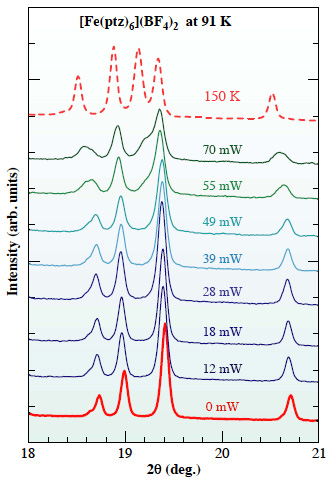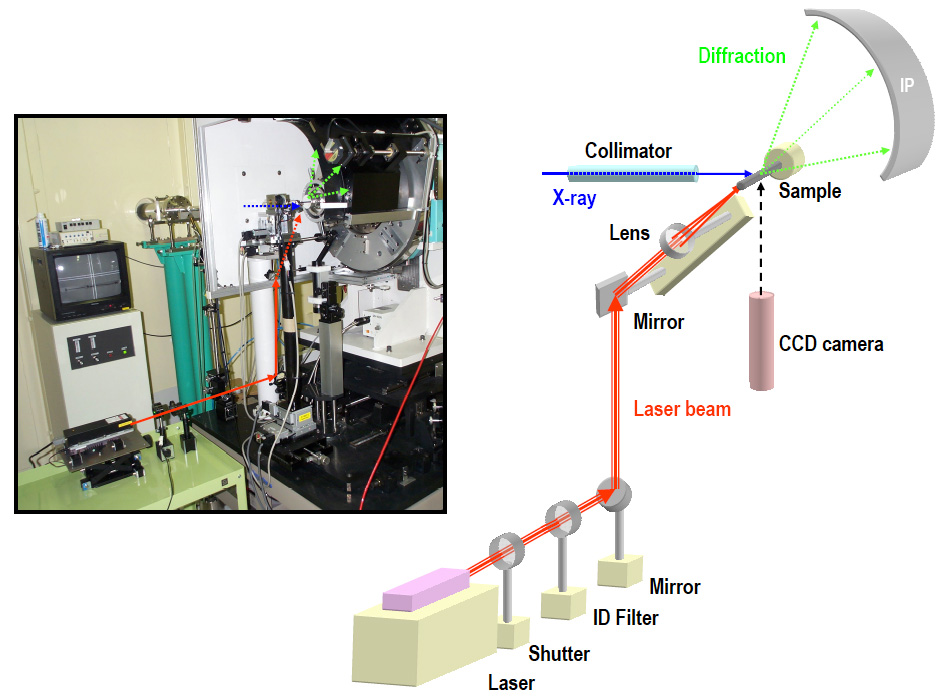Structural analysis under photo-excitation of a spin crossover complex
Inquiry number
SOL-0000000963
Beamline
BL02B2 (Powder Diffraction)
Scientific keywords
| A. Sample category | organic material |
|---|---|
| B. Sample category (detail) | magnetic material, solid-state crystal, organic material, crystal |
| C. Technique | X-ray diffraction |
| D. Technique (detail) | powder diffraction |
| E. Particular condition | low-T (~ liquid N2), Photo irradiation |
| F. Photon energy | X-ray (4-40 keV) |
| G. Target information | molecular structure, structure analysis, crystal structure, structural change, phase transition |
Industrial keywords
| level 1---Application area | storage device |
|---|---|
| level 2---Target | HD,MO, CD-R、DVD |
| level 3---Target (detail) | magnetic layer |
| level 4---Obtainable information | d-spacing (lattice parameter), interatomic distance, crystal structure |
| level 5---Technique | diffraction |
Classification
A80.14 magnetic materials, M10.20 powder diffraction
Body text
Powder diffraction is a powerful technique to study crystal structures. Using this technique, one can measure structural parameters such as lattice parameters, atomic positions, etc of crystalline materials. By using synchrotron radiation one can also obtain charge density level structures closely related with physical properties as well as structural parameters. The figure shows diffraction data of a spin crossover complex, [Fe(ptz)6](BF4)2 under photo-excitation. These data reveal the fact that there is a novel structure only under photo-excitation.
Fig. Laser power dependence of diffraction patterns in [Fe(ptz)6[(BF4)2.
[ Y. Moritomo, K. Kato, A. Kuriki, A. Nakamoto, N. Kojima, M. Takata and M. Sakata, Journal of the Physical Society of Japan 71, 2609-2612 (2002), Fig. 1,
©2002 The Physical Society of Japan ]
Source of the figure
Bulletin from SPring-8
Bulletin title
SPring-8 Research Frontiers, 2001B/2002A
Page
32
Technique
Powder diffraction using synchrotron radiations is a powerful technique to study crystal structures. The technique is applicable to condition and under photo-irradiation and provides knowledge about photo-excited structures.
Fig. A large Debye-Scherrer camera with laser irradiation system
Source of the figure
Presentation material for Beamline Report
Required time for experimental setup
1 shift(s)
Instruments
| Instrument | Purpose | Performance |
|---|---|---|
| Large Debye-Scherrer camera | Powder diffraction | Camera radius: 286.48mm, Temperature: 15-1000K |
References
| Document name |
|---|
| Y. Moritomo et al., Journal of the Physical Society of Japan, 71 (2002) 2609. |
Related experimental techniques
Single crystal structure analysis
Questionnaire
The measurement was possible only in SPring-8. Impossible or very difficult in other facilities.
This solution is an application of a main instrument of the beamline.
With user's own instruments.
Ease of measurement
With a great skill
Ease of analysis
Middle
How many shifts were needed for taking whole data in the figure?
Four-nine shifts


